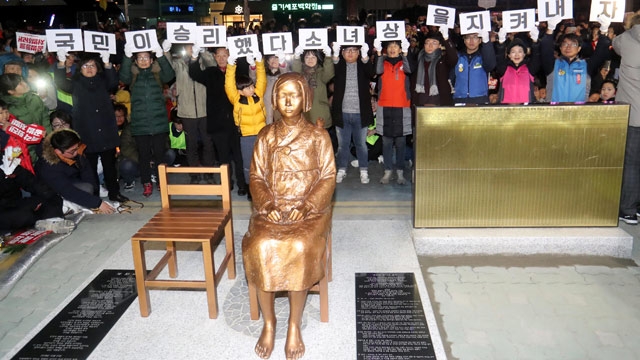KATRINA CROSBY WRITES – The young girl sits on a chair with a small bird on her left shoulder, her eyes staring straight ahead. A second chair is left empty beside her, inviting onlookers to reflect on what the statue represents.
This particular statue is located in Busan, South Korea, near the Japanese consulate, and commemorates comfort women, Koreans forced to service the sexual appetites of Japanese soldiers during World War II. It is a duplicate of the first such statue which went up in Seoul in 2011 near the Japanese Embassy.
The statue’s creators, artists Kim Seo-kyung and Kim Eun-sung, had originally planned to simply erect a memorial stone. But after pushback from the Japanese government, the pair said they wanted to make an even stronger political statement on the comfort women issue and came up with the current design.
In the years since, copies of the statue have appeared not just in South Korea, but around the globe. The one in Busan, however, is a major point of contention for bilateral relations. That’s because it came after a 2015 agreement between the two countries meant to put the comfort women issue to rest. In exchange for an apology and some money from Japan, Seoul said it would essentially stop trying to embarrass the Japanese over this chapter in its history.
So when the Busan statue appeared, Japan officialdom reacted swiftly, recalling both its ambassador and consul in Busan. That was in December, and it was only this month that Japan relented and re-stationed its officials in South Korea. On April 3, Japanese Foreign Minister explained the return, noting the need for “close communication with the South Korean government” in light of North Korea ratcheting up its conventional and nuclear missile programs. Perhaps to save face, Japan has left in place some punitive steps involving South Korean currency.
Japan and South Korea’s relationship has never been simple or smooth, particularly in regards to the comfort women issue.
During World War II, Japanese soldiers took Korean women and forced them to work in brothels as sex slaves. South Korea has long sought recognition and an apology. Although it has been decades since the war’s end, current Japanese Prime Minister Shinzo Abe originally indicated he had no plans to apologize on behalf of his country, claiming a lack of proof that the state had been officially involved.
On the South Korean side, the Lee Myung-bak government from 2008 to 2013 had been relatively progressive in terms of relations with Japan, but even it pushed the issue. When President Park Geun-hye took office in South Korea in 2013, her anti-Japanese sentiments flared, especially on the issue of comfort women. During a speech in March 2104 she directly addressed Japan and stated that the “pain of the 55 surviving comfort women should be healed. The more Japan denies past history, the more miserable Japan becomes, being driven into a corner.”
Even U.S. President Barack Obama got involved, trying to find a way for the two countries to get past the issue.
Finally, in November 2015, Park agreed to meet with Abe in hopes of reconciling and moving forward. The talks led to an agreement in which Japan acknowledged its role in the comfort women issue, and Abe apologized. In addition, Japan agreed to provide 1 billion yen (around $8 million) to a fund specifically for surviving comfort women.
As part of the agreement, however, South Korea would have to relocate the comfort women statue that was next to the Japanese Embassy. In addition, it would need to stop any official criticisms of Japan over the issue. Last, Japan and South Korea noted that this agreement was “final and irrevocable.” The only problem was that the agreement was never officially recorded and published. And Park was eventually impeached on corruption charges. And survivors said they’d been sold out. And the mayor of Seoul refused to relocate the original statue as apparently agreed to….
And that’s where things stand, at least until a new South Korean government is voted in next month when, if cooler heads prevail on both sides, the comfort women issue will be near the top of issues to be equitably settled between Tokyo and Seoul. Perhaps the two countries can finally move forward, unencumbered by this tragic chapter in their shared past, and the victims of a crime from the last century can take comfort in both recognition and recompense.

